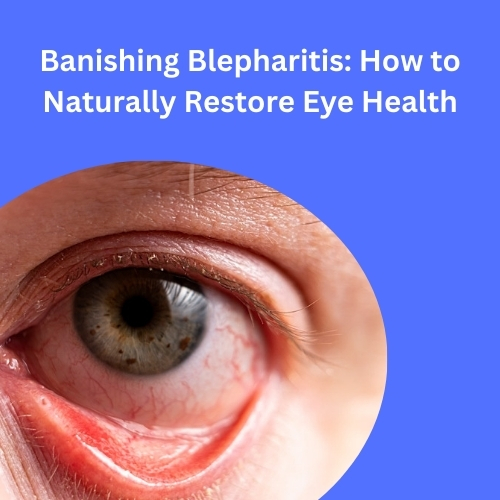Blepharitis is a common but often frustrating eye condition that leads to inflammation of the eyelids, irritation, redness, and discomfort. While conventional treatments exist, many people are turning to natural remedies to manage symptoms and promote long-term eye health. We explore effective natural methods for banishing blepharitis and restoring optimal eye function. We will also discuss the benefits of incorporating a Blepharitis Eye Health Supplement for Pain Relief into your routine.
What is Blepharitis?
Blepharitis is a common inflammatory condition that affects the eyelids, leading to discomfort, irritation, and sometimes vision problems. It occurs when the tiny oil glands near the base of the eyelashes become clogged, causing redness, swelling, and flaky skin. While blepharitis is not contagious, it can be persistent and challenging to manage without proper care.
Types of Blepharitis
Blepharitis is generally classified into two main types:
1. Anterior Blepharitis – This type affects the outer part of the eyelids where the eyelashes grow. It is often caused by bacterial infections, dandruff, or allergies.
2. Posterior Blepharitis – This occurs when the oil glands in the eyelids (Meibomian glands) become blocked. It is commonly associated with skin conditions such as rosacea or seborrheic dermatitis.
Causes of Blepharitis
Several factors can contribute to the development of blepharitis, including:
· Bacterial infections – Staphylococcus bacteria are a common cause.
· Seborrheic dermatitis – A skin condition that causes flaky, greasy scales.
· Rosacea – A chronic skin condition that leads to redness and inflammation.
· Meibomian gland dysfunction – Blocked oil glands in the eyelids.
· Allergies – Reaction to eye makeup, contact lenses, or environmental irritants.
· Demodex mites – Tiny mites that reside in hair follicles and contribute to inflammation.
Symptoms of Blepharitis
People with blepharitis often experience symptoms such as:
· Red, swollen, or itchy eyelids
· Burning or stinging sensation in the eyes
· Watery or dry eyes
· Crusty or flaky debris around the eyelashes
· Sensitivity to light
· A gritty feeling in the eyes
While it is not contagious, blepharitis can significantly impact daily life if left untreated. Fortunately, natural remedies can help manage symptoms and promote healthier eyes.
Natural Remedies for Banishing Blepharitis
1. Maintain Proper Eyelid Hygiene
One of the most effective ways to manage blepharitis naturally is by practicing good eyelid hygiene. Regular cleaning can help reduce bacterial buildup and prevent further irritation.
- Use a warm compress: Apply a warm, damp cloth to your eyelids for 5–10 minutes to loosen debris and open blocked oil glands.
- Gentle eyelid scrubs: Use a diluted baby shampoo or a mild tea tree oil cleanser on a cotton pad to cleanse the eyelids.
- Rinse thoroughly: Ensure no residue remains to prevent further irritation.
2. Use Natural Anti-Inflammatory Agents
Certain natural ingredients have powerful anti-inflammatory and antimicrobial properties that help soothe irritated eyelids:
- Tea Tree Oil: Known for its antibacterial and antifungal properties, diluted tea tree oil can reduce Demodex mites, a common cause of blepharitis.
- Aloe Vera: Applying fresh aloe vera gel to the eyelids can reduce inflammation and provide a cooling effect.
- Coconut Oil: Rich in fatty acids, coconut oil helps moisturize dry eyelids and reduce irritation.
3. Improve Your Diet for Better Eye Health
Diet plays a crucial role in banishing blepharitis and maintaining overall eye health. Focus on consuming anti-inflammatory and nutrient-rich foods:
- Omega-3 Fatty Acids: Found in fish, flaxseeds, and walnuts, omega-3s help reduce eyelid inflammation and support oil gland function.
- Vitamin A: Essential for eye health, vitamin A can be obtained from carrots, sweet potatoes, and leafy greens.
- Probiotics: Maintaining gut health with probiotic-rich foods like yogurt and kefir may help reduce systemic inflammation.
4. Stay Hydrated and Blink More Often
Dehydration can lead to dry, irritated eyes, exacerbating blepharitis symptoms. Drink plenty of water and consciously blink more often, especially when using screens for extended periods.
5. Use Herbal Remedies
Several herbs have been traditionally used to support eye health and reduce inflammation:
- Chamomile Tea Compress: Soak a cotton pad in chamomile tea and apply it to the eyelids for a soothing effect.
- Goldenseal: Known for its antibacterial properties, goldenseal can be used as an eyewash to cleanse the eyelids.
- Bilberry Extract: This powerful antioxidant supports overall eye health and reduces inflammation.
6. Try a Blepharitis Eye Health Supplement
Adding a targeted Blepharitis Eye Health Supplement to your routine can provide essential nutrients that support eyelid and tear gland function. Look for supplements containing:
- Omega-3 fatty acids
- Vitamin A
- Lutein and Zeaxanthin
- Probiotics
- Anti-inflammatory herbs like turmeric and eyebright
Lifestyle Adjustments for Long-Term Relief
1. Avoid Eye Irritants
Reduce exposure to smoke, dust, and allergens that can trigger blepharitis flare-ups. Wearing protective sunglasses can help shield your eyes from environmental irritants.
2. Manage Stress
Chronic stress can weaken the immune system, making it harder to fight infections. Practice stress-reducing activities like meditation, yoga, or deep breathing exercises.
3. Get Enough Sleep
Lack of sleep can contribute to eye strain and worsen blepharitis symptoms. Aim for at least 7–8 hours of quality sleep per night.
Conclusion
Blepharitis can be a persistent condition, but with the right natural remedies and lifestyle adjustments, you can effectively manage symptoms and promote long-term eye health. By maintaining proper eyelid hygiene, incorporating anti-inflammatory foods and herbs, and using a high-quality Blepharitis Eye Health Supplement, you can work toward banishing blepharitis and restoring comfort to your eyes naturally. Prioritize eye care today and enjoy a clearer, healthier vision for years to come!





Comments